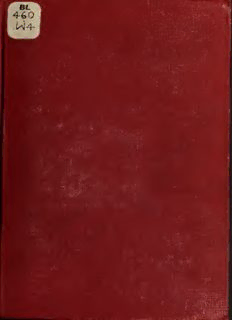
Hodder Michael Westropp – Ancient Symbol Worship Influence of the Phallic Idea in the Religions ... PDF
Preview Hodder Michael Westropp – Ancient Symbol Worship Influence of the Phallic Idea in the Religions ...
-\/4- Book Gosyriglit^i" CCFmiGHTDEPOSIT PHALLISM IN ANCIENT WORSHIPS. : ANCIENT SYMBOL WORSHIP. INFLUENCE OF THE PHALLIC IDEA Religions of Antiquity. HODDER WESTROPP M. AND CVSTANILAND WAKE. INTRODUCTION, ADDITIONAL NOTES, AND AN APPENDIX. By ALEXANDER WILDER, M.D. NEW YORK: 4- J. W. BOUTON, 706 BROADWAY. LONDON TRUBNER & CO., 59 LUDGATE HILL. 1874. EnteredaccordingtoActofCongress,intheyear1874, By JAMES W. BOUTON, IntheOfficeoftheLibrarianofCongress,atWashington. PEEFACE. The historian Gibbon has remarked that "a lively desire of knowing and recording our ancestors so generally prevails, that it must depend on the influence of some common principle in the minds ofmen." To this we are probably to refer the inquisi- tiveness that leads individuals to the investigation of the relics of bygone periods, whether as naturalists, philologists, or his- torical inquirers. The Book ofGenesis has been eagerly scruti- nized as containing a divinely-inspired record of the Origin of Mankind and ancient histories are carefully turned over in ; quest of clews in the same direction. The studies of language and etymology are interesting as affoi'ding traces of the ancestry of our modern peoples. The same plea holds good in regard to religious inquiry. Language and worship are crystallized history. Unbecoming alike are the superciliousdisdain and the sancti- monious contempt flung by pretentious men upon ancient ideas and usages. The ignorant cock that scorned the jewel because he knew not how to ascertain its value,, and preferred the corn which hecould scratchout from the dunghill, isanapt likeness of suchpersons. Itiscertainlypropertopaydueregardtoutilityand present advantage. But the disposition to confine the attention to that limit is as imbruting and sensual as anything in fetish- worship or the orgies of the old-time divinities. The generous mind will cast aside such a temper, and, in obedience to its own instincts, hasten to broader fields of exploration, whether in natural science, metaphysical inquiry, or archEeological investiga- tion. Labor which makes a person better acquainted with himselforhis fellow-men is not wasted. In former periods it was the practice to check exuberant vi Preface. curiosity by destroying records, and inflicting summary penal- ties on those who exceeded the bounds that had been set to scientific and Hterary pursuits. Cardinal Ximenes burned the old Arabic manuscripts Galileo languished in prison Socrates ; ; drank the hemlock, and Servetus perished at the stake the ; Gauls destroyed the annals of Old Rome, and the Romans those of ancient Carthage and Spain the Brahmins were alike malig- ; nant to the population and literature of Hindustan, and the Moslems equally destructive to the books that fell in tlieir way from Benares and Bactria to Syria and Alexandria. All hoped in this way to put an end to the supremacy of scholars and rival nations, and to confine thought to the metes and limits of re- ligious orthodoxy. They succeeded for a time, but only par- tially. Knowledge extinguished in one place broke forth in another and everynation that burned records and slaughtered ; teachersspeedilydeclinedintoinsignificance. At the present time the Index Expurgatorius of the Vatican, so far from excluding books from general reading, has become the best medium for advertising them and the achievements of Omar at Alexandria, ; Nabonasar at Babylon, and Torquemeda at Salamanca, to be successful, would requii-e a general holocaust. Those who pro- test against scientific and archaeological studies as tending to unsettle the mind in regard to accepted doctrines, are speaking too late. Devotion which is born of ignorance is not worthy of being cherished. Nevertheless, there is little ground for apprehension that the foundations of a genuine religious belief will be undermined. The investigation of the beginnings of a religion is never the work of infidels, but of the most reverent and conscientious minds. Those who are at liberty to develop themselves freely, will seldom molest themselves about the opinions of others. Mystics and philosophers do not clash, but often arrive at like conclusions by different routes and the exercise of different faculties ofmind. The papers of Messrs. Westropp and Wake, showing the influ-
Description: